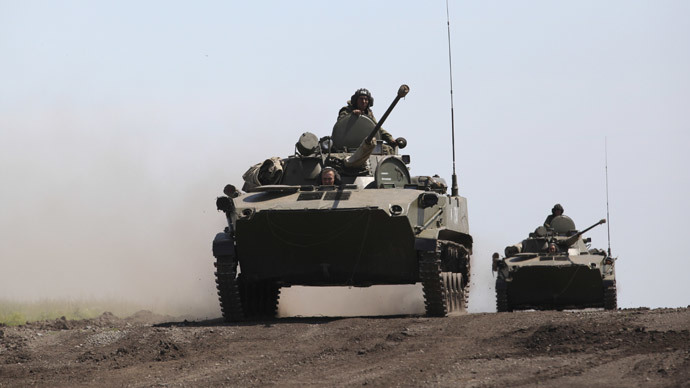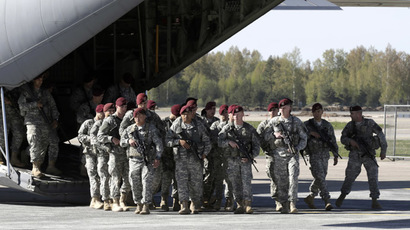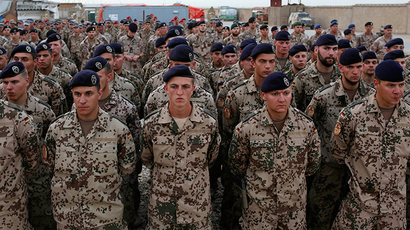Russia to adjust military doctrine due to NATO expansion, Ukraine crisis

Moscow is to review its military doctrine, a move that is caused by expansion of NATO in Eastern Europe, problems of missile defense and the crisis situation in neighboring Ukraine, says an official from the Russia’s Security Council.
“I have no doubts that the issue of drawing of military infrastructure of NATO member-countries to the borders of our country, including via enlargement, will remain one of the external military threats for the Russian Federation,” Mikhail Popov, deputy secretary of the Security Council said in an interview to RIA Novosti.
All NATO’s actions show that both the US and NATO are trying to escalate a deterioration of relations with Russia, he added.
“We consider that defining factor in [Moscow’s] relations with NATO will remain the unacceptability for Russia of the expansion plans of alliance’s military infrastructure to our borders, including via enlargement,” he stated.
Establishing and deploying of strategic missile defense systems which are undermining the global stability, as well as bringing the weapons into space, will also remain major military threats for Russia, he added.
“The USA wants to strengthen its troops in Baltic States. [They] have already decided to transfer its heavy weapons and military equipment, including tanks and armored infantry vehicles, to Estonia. And all this next to Russia’s border.”
The acting military doctrine was adopted in 2010. The new version will be released by the end of 2014, said Popov.
According to Popov, the pursuit of the USA and NATO members to increase its strategic offensive potential is becoming more evident.
They are trying to do this “at the expense of development of a global missile defense system” and “the elaboration of new weapons, including advanced hypersonic weapon (AHW).”

The 2010 military doctrine caused the most acute reaction in the USA and NATO, said Popov.
“Many high-ranked officials reproached the leaders of our country saying that NATO isn’t a Russia’s enemy and will never attack Russia. But is that true?” he asked. “We were assured of good intentions, but the actions of recent years show entirely different things.”
He added that Russia had not managed to establish an equal dialogue with its Western partners.
“Everyone waits one-sided concessions from Russia in many international relations issues.”
According to Popov, “the role of Russia in the Ukraine crisis is subjectively defined and thus wrong conclusions are drawn and wrong measures are applied."
“There is an unprecedented informational-propagandist campaign against Russia. The image of the enemy is presented in the face of Russia and its politics is considered as a new threat to NATO.”
‘Any aggression against Crimea is aggression against Russia’
“Today Crimea is a territory of Russian Federation, and military aggression against Crimea will be considered as aggression against Russian Federation with all ensuing consequences,” said Popov.
“The military unit in Crimea, set by the president’s [Vladimir Putin] decision, is self-sufficient and is capable of repelling an attack of a potential aggressor on the territory of Russia,” he added.
The tasks of Black Sea fleet and the military units on the peninsula remain the same in Crimea – to provide military security of the country.
“I would like to stress that the borders of the Russia Federation with the CIS [Commonwealth of Independent States], including those with Ukraine, are not covered by the military, its control is performed via customs services,” said Popov.

‘We’re open to cooperation in Arctic’
The military doctrine will also take into account the stable development of the Arctic – a region thought to contain vast reserves of oil and gas.
“The major national interests of Russia in this region will be the use of the Arctic as a resource base capable of providing the needs of Russia in hydrocarbon riches, water bio resources and other strategic material for solving social-economic tasks.”
Popov added that Russia “is open for cooperation in the Arctic.”
“We not only call for cooperation, but also confirm this intention. Russia’s Security Council in the Arctic Circle is organizing meetings with the officials of the countries of the Arctic Council which show our objects,” he said. “By the way, not all the countries of the region show the same goodwill and openness.”
The five Arctic states - Canada, Denmark, Norway, Russia and the US – have for several years now been in a bitter dispute over how to divide up this resource-rich region.














